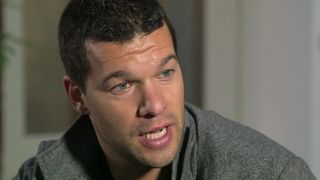Train hard, finish easy
The former Chelsea and Bayern Munich midfielder spent hours on the training pitch honing his finishing skills. Watch our video and then try his shooting drills

As you might expect, being German, Michael Ballack loved to train. This was where he mastered his craft.
A combination of natural talent and dedication helped mould him in to one of the finest goalscoring midfielders of his generation.
The stats speak for themselves – Ballack scored 42 goals in 98 games for Germany – putting him eighth in the all-time scoring list for Die Mannschaft.
But what was it that made Ballack such a lethal finisher? There are strikers who dedicate whole training sessions to hitting the back of the net, but they still freeze in front of goal come game day.
How did Ballack manage to take his precision finishing from training in to a game? What were the secrets to his training methods? What drills did he use?
To find out the answers to these questions and more watch this video interview with the former Chelsea and Bayern Munich star.
Also see:
Michael Ballack: How to be the complete midfielder
Michael Ballack: Win the German way
Michael Ballack: The secrets to leadership
Michael Ballack: Coping with pressure
"You can train it, you can train to finish; that's what you should train, always. Bring yourself in situations where you finish. That means that when you get the ball, the first touch is really important.
Get the ball in different situations of bouncing balls on the floor, strong balls. The first touch is always really important that you have a quick finish; one touch and then finish. You have to train it. As more as you train it, as comfortable you get in the game, and it's getting in an automatic rhythm, so you don't think.
The game is much quicker than in training because the opponents are not so hard-defending like in the match, because if in a match always is tied, you don't have that much time.
It should be trained a lot, that it goes into automatic rhythm. Then you don't think in the game and you get the ball, it's automatic; touch, you control the ball, and then you have to strike. Training is a lot.
The strikers, they done, they stay, they got crosses, they finished in the box, because most of the time, they're on the box and they have to finish the ball from there.
My job was more, or what I'm trying to do in training, is I know in what situations I'm doing in the game, mostly. Let's say free kicks, let's say shooting from outside or from the edge of the box.
These kinds of situations, I try to simulate in training. Sometimes, mostly, without an opponent defender, but that was important for me; left foot, right foot.
You can train this, and then I knew exactly in what positions I'm mostly in the game so that I could train it really well.
I liked always crossing. There are different kinds of competitions with two teams; two players in the box and who's scoring more goals, getting a cross from the left, from the right, maybe having another shoot in combination. Running out of the box, you get the ball, you turn, and then you shoot.
Exercises like this, I always enjoyed most because I could score, and that's the most thing, of course, what you enjoy in football, when you can score a goal.
That's the greatest moment ever during a game. You have a lot of tactic in a game, you fight, a lot juice, but if you score a goal, it's the best moment. That's what I always enjoy in training, as well.
Yes, you can simulate a lot of exercises which happen a lot in the game. Mostly you have as nearer you come to the goal, mostly, you're marked; you're not free.
In training, you can simulate it in free, you're free, but you have to know in the game you are marked. There's a defender who doesn't want that you score, so you have to try to simulate in training as well.
Do it in a high pace and do it with a feint, with a movement, where your opponent doesn't know what you do. You can train this. That's not just taking the ball and shoot, like I'm free.
It's always the quality of training and you know exactly what's happened in the game. Then you have to do it 100% or even more, then it goes automatically or better in a match."
Get FourFourTwo Newsletter
The best features, fun and footballing quizzes, straight to your inbox every week.

Thank you for reading 5 articles this month* Join now for unlimited access
Enjoy your first month for just £1 / $1 / €1
*Read 5 free articles per month without a subscription

Join now for unlimited access
Try first month for just £1 / $1 / €1
Most Popular





